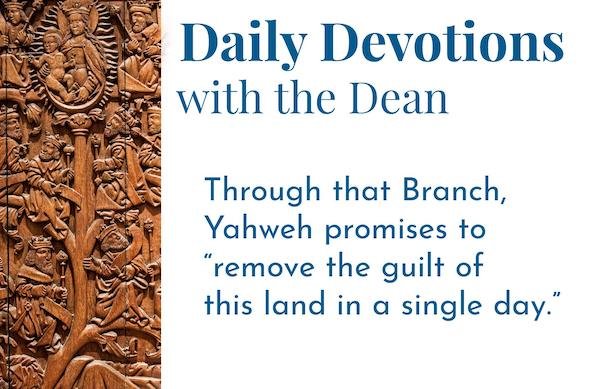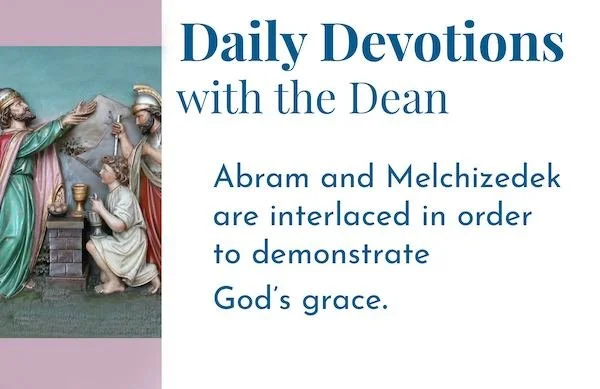Wednesday • 12/27/2023 •
Feast of St. John, Year Two
This morning’s Scriptures are: Psalm 97; Psalm 98; Proverbs 8:22–30; John 13:20–35
This morning’s Canticles are: following the OT reading, Canticle 13 (“A Song of Praise,” BCP, p. 90); following the Epistle reading, Canticle 18 (“A Song to the Lamb,” Revelation 4:11; 5:9–10, 13, BCP, p. 93)
Welcome to Daily Office Devotions. I’m Reggie Kidd, and it’s a joy to be with you this Third Day of Christmas!
Feast of St. John . In the tradition of the Christian Year, December 27 is a day to celebrate the life and ministry of St. John, Son of Zebedee, Beloved Disciple, and author of the Fourth Gospel, 1,2,3 John, and Revelation. The Feast of St. John is the second panel in our “Christmas Triptych,” comprised of the Feasts of St. Stephen, St. John, and the Holy Innocents.
In last year’s reflections on the Feast of St. John (Year One), we focused on the unparalleled way in which John portrays the unambiguous divinity of Jesus all the while presenting poignant cameos of his humanity. The readings for this year, Year Two, cause us to ponder John as “the Beloved,” and what his being “the Beloved” says about Jesus as the embodiment, the bearer, and the messenger of God’s love.
For John, God both has and is relationship. That’s the only way to explain the Word being “with God” and “being God”: “In the beginning the Word was with God and the Word was God” (John 1:1). Jesus (the Word) can associate with God (the Father), and that means that God can have relationship. But if Jesus also is God in the same way that his Father is God, then that means relationship constitutes the very being of God.
Image: The St John Altarpiece, Hans Memling (ca. 1479), Memling Museum, Bruges, Belgium, Pixabay.
Proverbs 8: sweet anticipation. It takes the Incarnation itself to put that mystery before us so starkly. But that mystery had already been strongly hinted at in the Old Testament. In Proverbs 8, Solomon imagines “Wisdom” personified, and as accompanying God at creation—indeed, as being a “master worker” in the laying of the foundations of the earth (Proverbs 8:29c,30a). Christians understandably look back on the language of a personified “Lady Wisdom” in Proverbs (see the contrast between Dame Folly and Lady Wisdom in Proverbs 7–9) as a tantalizing preview of the Wisdom and Word of God taking human form in Jesus Christ.
Especially intriguing is the love that flows between Wisdom and the LORD: “…then I was beside him, like a master worker; and I was daily his delight” (Proverbs 8:30). It becomes the Eternal Son’s mission—he who is quite literally, not merely literarily, the personification of Wisdom—to bring all the way to us the love that has always characterized God’s own self.
John 13: Divine love at the table.
By washing his disciples’ feet, Jesus quintessentially displays the love that is God’s nature. Today’s verses extract lessons from that event. They unpack for us the “So what?” of the foot washing.
Intimacy eclipses authority. “One of his disciples—the one whom Jesus loved—was reclining next to [Jesus]; Simon Peter therefore motioned to him to ask Jesus of whom he was speaking” (John 13:23–24). Notice: Peter (the bearer of the keys) knows to come through John (the beloved at Jesus’s breast) to ask the hard question about who the betrayer is. Love precedes leadership. That’s why we will find Jesus asking Peter three times if Peter loves him before Jesus charges him: “Feed my sheep” (John 21:17). John teaches us to love Jesus first; then we’ll find out what we need to know and what he wants us to do. I repeat: Love him first.
Jesus insists on offering fellowship, even when it’s certain to be rejected. Love is who Jesus is. Even after Satan “puts it into the heart” of Judas Iscariot to betray Jesus (John 13:2), and even though Jesus knows full well that this is the case, Jesus washes Judas’s feet along with everybody else at that table.
Knowing also, as he no doubt does, that Judas will slink off “into the night” (John 13:30) to commit the most horrific act of cosmic treason and personal betrayal the world has ever seen, nonetheless, Jesus offers Judas the dipped morsel of fellowship and friendship. I’m hard pressed to think of a better illustration of a love that never quits, or of the veracity of C. S. Lewis’s saying, “The door of hell is locked from the inside.”
Jesus calls upon us to make the mystery of God’s loving nature visible and believable. Jesus tells his disciples in a straightforward way what to do with the tableau he has painted for them: do likewise. “If I your Lord and Master have washed your feet, you too ought to wash one another’s feet” (John 13:14). Nothing less is at stake than the world’s being able to see in the disciples’ love for one another that they belong to Jesus: “…by this, the world will know that you are my disciples, if you have love for one another” (John 13:35). Beyond the authenticity of their discipleship, Jesus’s followers’ oneness will open a window for the world onto the very oneness within the Godhead: “…that they may become completely one, so that the world may know that you have sent me and have loved them even as you have loved me” (John 17:23).
That is a staggeringly wonderful prospect. You and I may not know the ontological argument for God’s existence (the idea that existence itself points to a Maker). But we can display God’s being and attributes by loving one another. We may not be able to articulate the teleological argument for God’s existence (the idea that the design of nature suggests an intelligence behind nature). But we can show that the design for human flourishing is creativity not destruction, harmony not disharmony, truthfulness not prevarication, kindness not cruelty—prompting the question even among nonbelievers, how is it we all intuitively know that’s what we were made for, regardless of how well we live up to the design? As the Beloved Disciple is later to write, “No one has ever seen God; if we love one another, God lives in us, and his love is perfected in us” (1 John 4:12)—in other words, the closest the invisible God comes to becoming visible is in our love for one another.
Be blessed this day,
Reggie Kidd+













